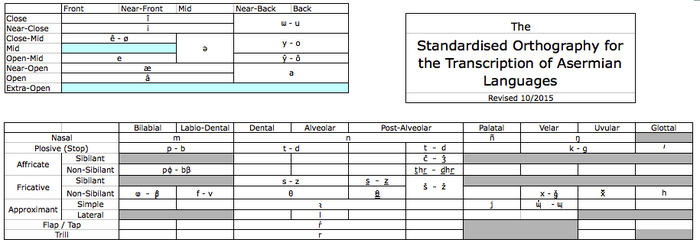By all means, take a look around. Thank you.
This project was abandoned for quite some time, but I recently revived it somewhat. I might make a page about that or I might not. We'll see.
| Progress 31% | ||||||||||||||||||||||||||||||||||||||||||||||||||||||||||||||||||||||||||||||||||||||||||||||||||||||
|
| ||||||||||||||||||||||||||||||||||||||||||||||||||||||||||||||||||||||||||||||||||||||||||||||||||||||
|
||||||||||||||||||||||||||||||||||||||||||||||||||||||||||||||||||||||||||||||||||||||||||||||||||||||
| Proto-Asermian *ꝛakêjet̠hr̠æβ | |||
|---|---|---|---|
| Type | |||
| Fusional-Synthetic | |||
| Alignment | |||
| Nominative-Accusative | |||
| Head direction | |||
| Initial | |||
| Tonal | |||
| No | |||
| Declensions | |||
| Yes | |||
| Conjugations | |||
| Yes | |||
| Genders | |||
| No | |||
| Nouns decline according to... | |||
| Case | Number | ||
| Definiteness | Gender | ||
| Verbs conjugate according to... | |||
| Voice | Mood | ||
| Person | Number | ||
| Tense | Aspect | ||
Proto-Asermian, natively *ꝛakêjet̠hr̠æβ (IPA: /[unsupported input]aˈke.jɛ.[unsupported input]æ[unsupported input]/) was the common ancestor of the Asermian family of languages, which includes Rıkučreb, Rowiktob, and Karbash. It was once spoken by the Asermian race, a once vibrant humanoid avian people who were mostly killed in a catastrophe that occurred near their island. The sole survivor, Bakzwalt, continued to use the language, and taught it to various people, thus beginning the dichotomy that has resulted in multiple different descendent languages.
Classification and Dialects[]
Proto-Asermian is a part of the Asermian language family. Its origins are unknown, but most likely came from late Palaeolithic proto-speech spoken by members of the Asermian race, which included Bakzwalt. Unlike actual birds, the Asermian race did not possess a Hyoid apparatus, and therefore had a flexible tongue. However, their lack of teeth and lips effectively made articulation of labiodental consonants and rounded vowels impossible, as well as making articulation of alveolar consonants and certain plosives difficult.
Phonology[]
Consonants[]
| Bilabial | Labio-dental | Dental | Alveolar* | Post-alveolar | Palatal | Velar | Uvular | Pharyngeal/Epiglottal | Glottal | |
|---|---|---|---|---|---|---|---|---|---|---|
| Nasal | m | n | ɲ | ŋ | ||||||
| Plosive (Stop) | t̠ d̠ |
k g |
ʔ | |||||||
| Sibilant Affricate | tʃ dʒ |
|||||||||
| Non-Sibilant Affricate | (pɸ) (bβ) |
(tθ͇) - tɹ̠̊˔ dɹ̠˔ |
||||||||
| Sibilant Fricative | s̠ - ʃ z̠ - ʒ |
|||||||||
| Non-Sibilant Fricative | ɸ β |
(θ͇) - ɹ̠̊˔ ɹ̠˔ |
x ɣ |
χ | h | |||||
| Approximant | ɹ | j | ɰ̊ ɰ |
|||||||
| Trill | ||||||||||
| Flap or tap | ||||||||||
| Lateral approximant | l |
- In the Post-Alveolar column, dashed pairs are Retracted Alveolar and Palato-Alveolar, respectively.
Characters in parentheses are not well attested or are relatively uncommon in Proto-Asermian.
Clicks[]
Proto-Asermian had one click consonant, the voiceless post-alveolar click /!/ , which occurred only when word final and preceded by a vowel.
Ejectives[]
Proto-Asermian had two ejective consonants, both of which occurred only when word final: the alveolar ejective /t'/ (which occurred only when preceded by a consonant), and the velar ejective /k'/.
Vowels[]
| Front | Near-front | Centre | Near-back | Back | |
|---|---|---|---|---|---|
| Close | i | ɯ | |||
| Near-close | ɪ | ||||
| Close-mid | e | ɤ | |||
| Mid | ə | ||||
| Open-mid | ʌ | ||||
| Near-open | æ | ||||
| Open | ɑ |
Phonotactics[]
Allophony[]
Stress Rules[]
Writing System[]
Proto-Asermian had no writing system, as it was long before the introduction of the original Immajer Racwaietrab script. In modern times it is transcribed using the Standardised Orthography for Asermian.

Grammar[]
Spelling[]
Conjunctions[]
Coordinating[]
Correlative[]
Subordinating[]
Prepositions[]
Articles[]
Definite Article[]
Indefinite Article[]
Nouns[]
Proto-Asermian was the only known Asermian language to use noun declension. Nouns declined according to case, gender, and number. Proto-Asermian had 3 noun cases: nominative, accusative, and genitive; 3 noun genders: masculine, feminine, and neuter; and 2 noun numbers: singular and plural. The table of declensions is shown below.
| Masculine | Feminine | Neuter | ||||
|---|---|---|---|---|---|---|
| Singular | Plural | Singular | Plural | Singular | Plural | |
| Nominative | z̠ə | z̠əkɚ | ɑ˞ | ɑ˞ | ||
| Accusative | z̠îekɚ | z̠îekɚk' | ɚ | ɚk' | ||
| Genitive | z̠ək' | z̠əkek' | t̠ɚ | t̠ɚk' | ||
Pronouns[]
Possessive[]
Adjectives[]
Adverbs[]
Degrees of Comparison[]
Verbs[]
| infinitive | êâ ... ꝛî | |||||
|---|---|---|---|---|---|---|
| present participle/gerund | ɰ̊yə | |||||
| past participle | ɰ̊ɯy | |||||
| indicative | imperative | conditional | ||||
| singular | plural | singular | plural | singular | plural | |
| preterite | ñɯ̄a! | s̠ɯ̄an | ||||
| z̠βɯ̄a | lβɯ̄a | |||||
| hɯ̄a / xɯ̄a / t̠ɯ̄ak' | mehɯ̄a | |||||
| present | ñə! | s̠ən | nɯ̄ | s̠ɯ̄ | nî! | s̠în |
| z̠βə | lβə | z̠βɯ̄ | lβɯ̄ | z̠βî | lβî | |
| hə / xə / t̠ək' | mehə | hî / xî / t̠îk' | mehî | |||
| future | ŋy! | s̠yn | ||||
| z̠βy | lβy | |||||
| hy / xy / t̠yk' | mehy | |||||
}
Perfect Aspect[]
Continuous Aspect[]
Syntax[]
Lexicon[]
Example text[]
Proto-Asermian[]
English[]
When in the course of human events, it becomes necessary for one people to dissolve the political bands which have connected them with another, and to assume among the powers of the earth, the separate and equal station to which the Laws of Nature and of Nature's God entitle them, a decent respect to the opinions of mankind requires that they should declare the causes which impel them to the separation.
